Character development in The Banner Saga deeply impacts gameplay and narrative outcomes. Players’ choices shape character interactions and moral dilemmas, influencing story progression and relationships. Unique character traits affect combat strategies and resource management, leading to varied gameplay experiences. The consequences of decisions enhance emotional connections and reflect themes of sacrifice and survival throughout the saga.
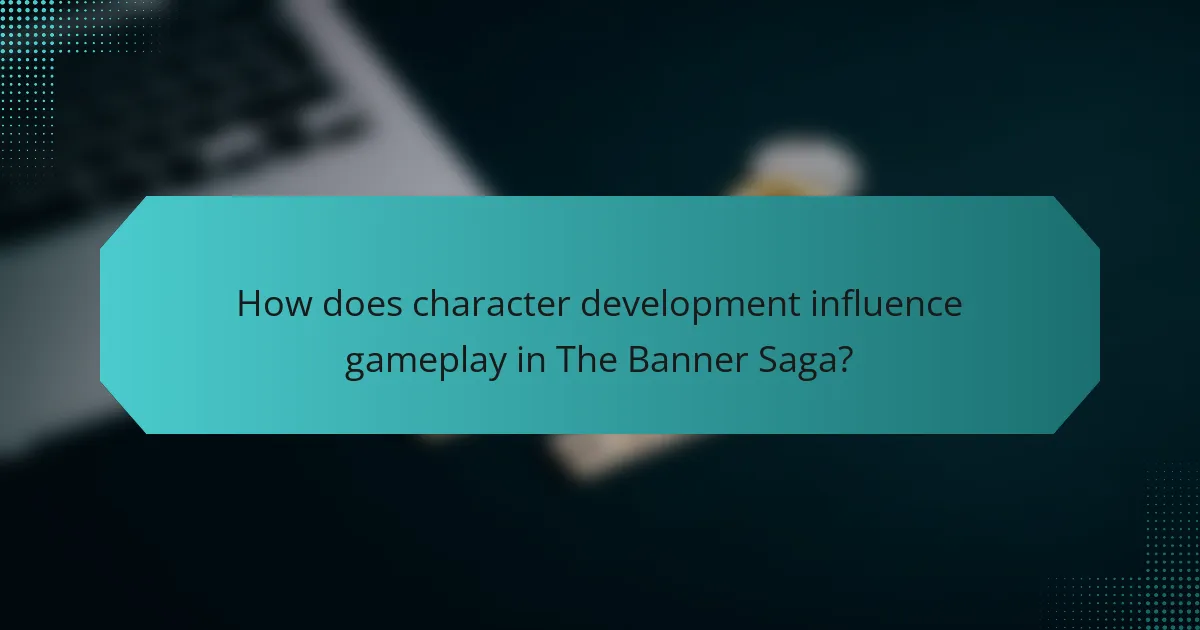
How does character development influence gameplay in The Banner Saga?
Character development significantly influences gameplay in The Banner Saga by shaping player choices and narrative outcomes. Players’ decisions regarding character interactions and moral dilemmas impact story progression and relationships among characters. Each character’s unique attributes, such as skills and backgrounds, affect combat strategies and resource management. As a result, players experience varied gameplay based on their character development choices, leading to multiple possible endings and enhancing replayability. The consequences of these choices create a deeper emotional connection between players and the story.
What are the key elements of character growth in the game?
Character growth in “The Banner Saga” revolves around choices, relationships, and consequences. Key elements include character backstories, decision-making impacts, and evolving relationships among characters. Players face moral dilemmas that shape their journey, influencing not only individual character arcs but also the overarching narrative. The game’s unique attribute lies in its strategic gameplay, where choices have lasting effects on survival and alliances. As a result, character development is deeply intertwined with the player’s actions and the unfolding story.
How do player choices affect character attributes?
Player choices significantly influence character attributes by determining skills, relationships, and narrative outcomes. Each decision shapes the character’s development, affecting their strengths and weaknesses. For instance, choosing to support a particular faction may enhance combat abilities, while prioritising diplomacy can improve social skills. Consequences of these choices manifest in gameplay, altering interactions and story progression. Ultimately, the interplay between choices and attributes fosters a dynamic experience, making each playthrough unique.
What role do relationships play in character development?
Relationships significantly influence character development in The Banner Saga by shaping choices and consequences. Through interactions, characters reveal their values and motivations. The evolving dynamics between characters affect their growth and decision-making, leading to unique narrative outcomes. This interplay highlights the importance of relationships in defining character arcs and enhancing the overall storytelling experience.
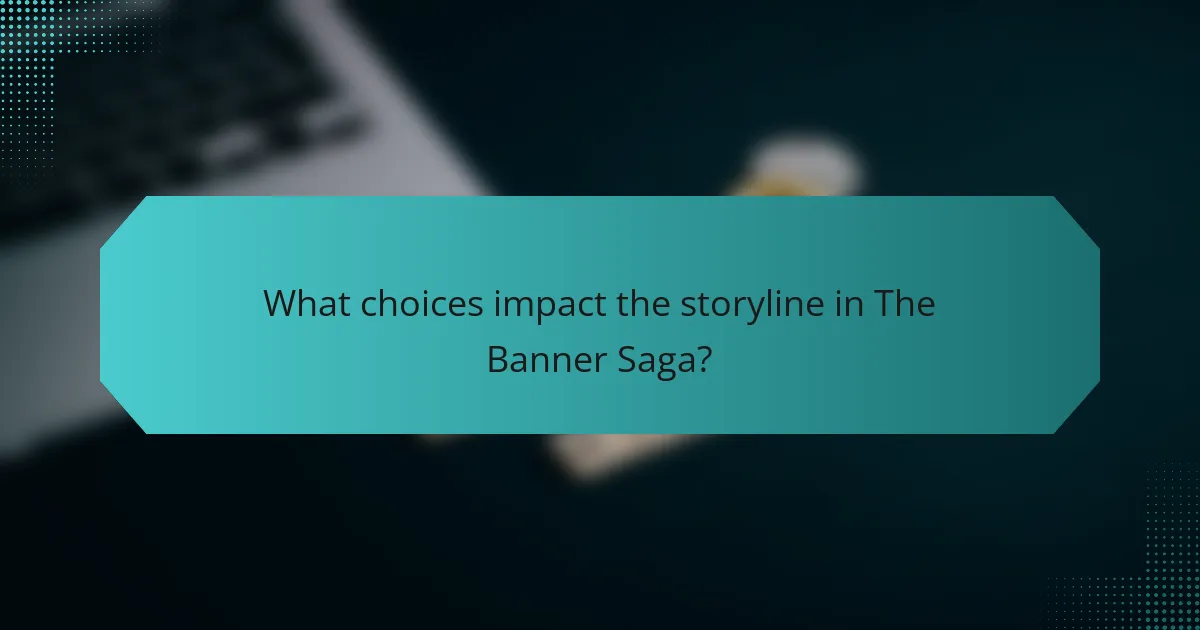
What choices impact the storyline in The Banner Saga?
Choices significantly impact the storyline in The Banner Saga by shaping character relationships and determining the fate of the group. Player decisions influence key events and character arcs, leading to various outcomes. For example, choosing to help or ignore certain characters can result in unique allies or adversaries. The game’s branching narrative ensures that choices resonate throughout the saga, affecting not only immediate scenarios but also long-term consequences in the sequel. Each decision reflects the core themes of sacrifice and survival, enhancing the emotional depth of the story.
Which decisions have the most significant consequences?
In “The Banner Saga,” decisions significantly impact character relationships and survival outcomes. Key choices include alliances, resource management, and combat strategies. These decisions shape the narrative and determine the fate of characters, influencing the overall story arc and player experience. For example, choosing to save a character may lead to different storylines and interactions later in the game. The consequences of these choices can result in unique endings, showcasing the game’s emphasis on meaningful decision-making.
How do player choices shape character arcs and outcomes?
Player choices significantly influence character arcs and outcomes in “The Banner Saga.” Decisions shape relationships, alter storylines, and determine character fates. Each choice can lead to diverse consequences, enhancing replayability. For instance, selecting allies impacts battle dynamics and narrative paths. This interconnectedness of choices and character development showcases the game’s emphasis on player agency and moral dilemmas. The unique attribute of this game is its blend of strategy and storytelling, where every decision resonates throughout the saga.
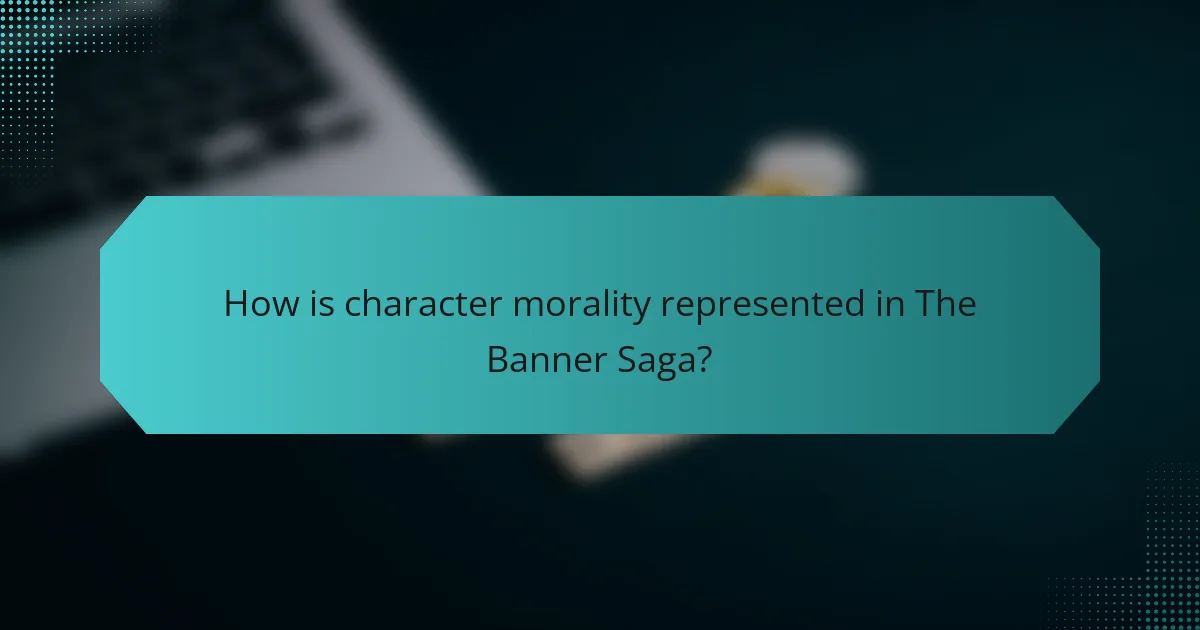
How is character morality represented in The Banner Saga?
Character morality in The Banner Saga is depicted through player choices that affect narrative outcomes. Decisions shape characters’ ethical alignments, revealing their complexities. The game’s branching storylines illustrate moral dilemmas, emphasizing consequences tied to player actions. This dynamic creates a rich tapestry of character development, reflecting themes of loyalty, sacrifice, and survival in a harsh world. Each character’s journey is unique, allowing for diverse moral interpretations based on player engagement.
What are the different moral dilemmas faced by characters?
Characters in “The Banner Saga” face moral dilemmas that challenge their values and relationships. Choices often involve prioritising survival over loyalty, sacrificing individuals for the greater good, and deciding between vengeance and forgiveness. These dilemmas shape character development and influence the narrative’s consequences. For example, a character may choose to save a friend at the risk of the group’s safety, illustrating the tension between personal bonds and collective responsibility. Each decision impacts the storyline, highlighting the complexity of morality in dire circumstances.
How does morality affect alliances and conflicts in the game?
Morality significantly influences alliances and conflicts in The Banner Saga. Characters’ ethical beliefs shape their decisions, affecting relationships and outcomes. Choices reflecting compassion or ruthlessness can lead to unexpected alliances or bitter rivalries. For example, prioritising the welfare of allies may strengthen bonds, while self-serving actions can incite distrust. The game’s narrative emphasizes that moral choices have lasting consequences, impacting the story’s progression and character development.
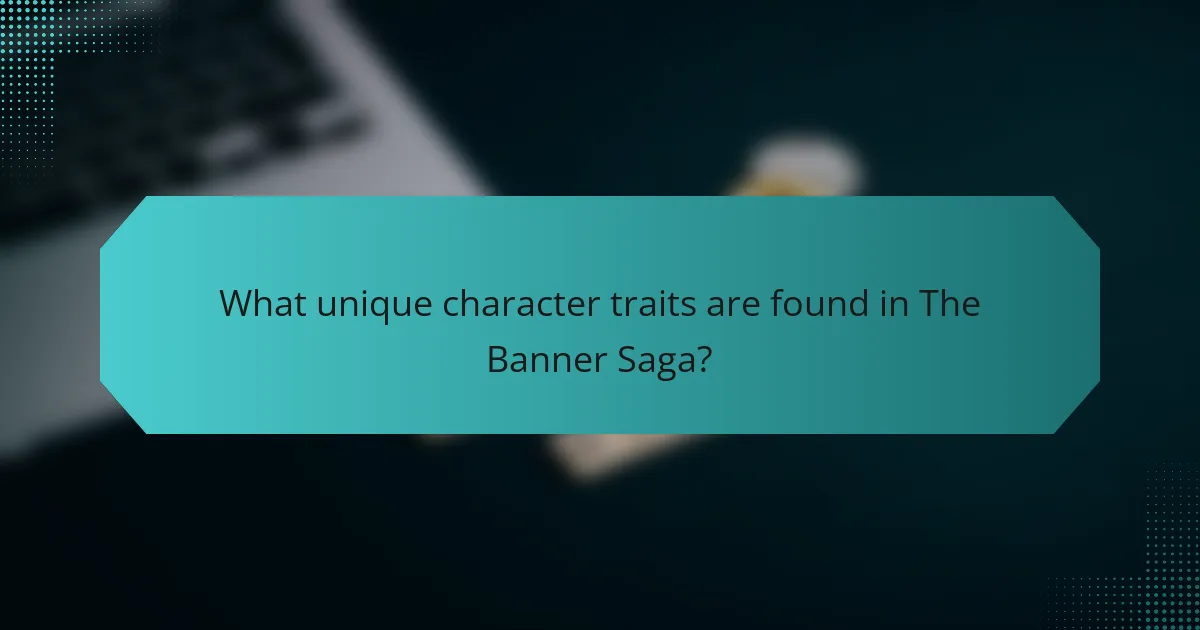
What unique character traits are found in The Banner Saga?
The Banner Saga features unique character traits that emphasize moral complexity and personal growth. Each character faces difficult choices that shape their development and relationships. For example, characters like Rook and Alette showcase resilience and leadership under pressure. Others, such as Iver, exhibit wisdom and a burdened past. These traits influence gameplay and narrative outcomes, creating a rich tapestry of interwoven stories. The consequences of players’ decisions further highlight the weight of these unique character attributes.
How do specific characters differ in their abilities and roles?
Characters in “The Banner Saga” differ significantly in abilities and roles, impacting gameplay and strategy. Each character possesses unique attributes that define their combat style and narrative choices. For instance, some characters excel in physical strength, while others may have powerful magical abilities. The roles they play can range from frontline warriors to supportive healers, affecting party dynamics and decision-making. Understanding these differences is crucial for optimizing character development and making strategic choices throughout the game.
What makes certain characters memorable within the narrative?
Memorable characters in “The Banner Saga” arise from deep development, impactful choices, and significant consequences. The narrative emphasizes character backstories and moral dilemmas, making players emotionally invested. Unique attributes, such as personal struggles and evolving relationships, enhance memorability. Choices affect not just the plot but also character fates, creating lasting impressions. As a result, players often reflect on their decisions and the characters’ journeys long after gameplay.
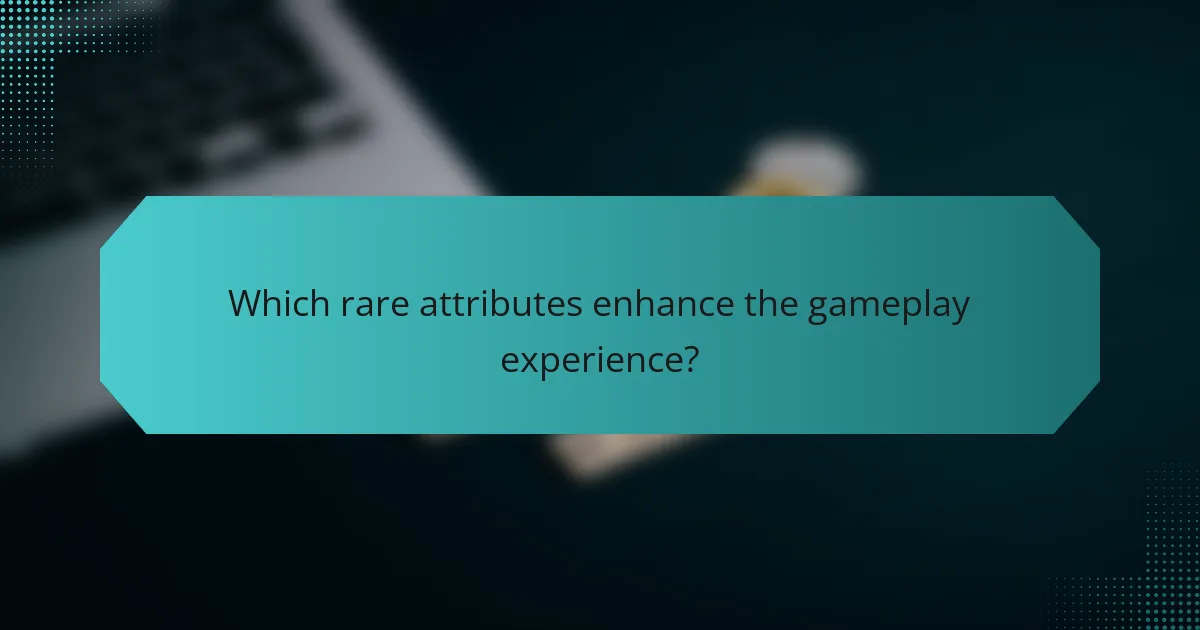
Which rare attributes enhance the gameplay experience?
Rare attributes that enhance gameplay experience in “The Banner Saga” include character backstories, decision impact, and unique character abilities. These elements create emotional depth and influence player choices. For example, characters with rich narratives can evoke stronger connections, leading to more meaningful gameplay. Additionally, the consequences of decisions can vary significantly based on character development, affecting the story’s direction and player engagement.
What uncommon character interactions can players discover?
Players can discover unique character interactions in The Banner Saga through choices that affect relationships and narrative outcomes. For instance, selecting dialogue options can reveal hidden backstories or alter alliances. Characters like Rook and Alette showcase rare bonding moments influenced by player decisions. Additionally, certain interactions may only occur under specific conditions, such as character health or prior choices made in the story. These nuanced interactions enrich the gameplay experience and enhance character development.
How do hidden character traits influence player strategy?
Hidden character traits significantly shape player strategy in The Banner Saga. Players must consider these traits when making choices, as they influence character interactions and outcomes. For example, a character’s loyalty may affect their willingness to follow orders or support allies during critical moments. Understanding these hidden traits allows players to anticipate consequences and tailor their strategies accordingly. This depth of character development enriches gameplay, encouraging thoughtful decision-making and enhancing the narrative experience.
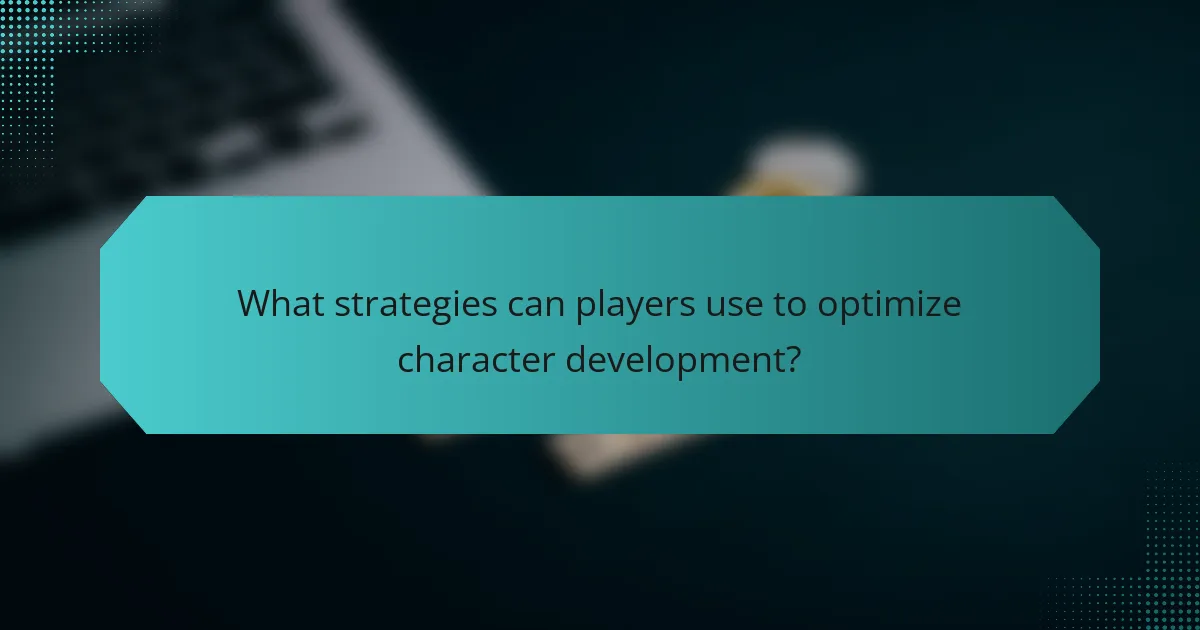
What strategies can players use to optimize character development?
Players can optimize character development in “The Banner Saga” by focusing on strategic choices that influence attributes and relationships. Prioritise character roles based on their strengths, such as choosing fighters for combat or support characters for healing.
Invest in skills that complement your playstyle, enhancing attributes like strength or willpower. Engage in meaningful interactions with other characters to deepen relationships, unlocking unique abilities and narrative outcomes.
Utilise resources wisely, balancing between upgrading characters and managing supplies. Make decisions that align with your long-term strategy, considering the consequences of each choice on character growth and story progression.
What are the best practices for making impactful choices?
To make impactful choices in “The Banner Saga,” prioritise character development, understand consequences, and evaluate relationships. Focus on these best practices:
1. Assess character strengths and weaknesses before decisions.
2. Consider the long-term effects of choices on the storyline.
3. Engage with other characters to build alliances and gain insights.
4. Reflect on past decisions to inform future actions.
These strategies enhance narrative depth and player engagement.
What common mistakes should players avoid in character management?
Players should avoid neglecting character roles, mismanaging resources, and failing to adapt strategies. Focusing on a single character can lead to imbalances. Understanding each character’s strengths and weaknesses is crucial for effective team dynamics. Additionally, overlooking the impact of choices on character relationships can lead to unintended consequences.